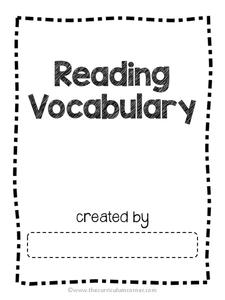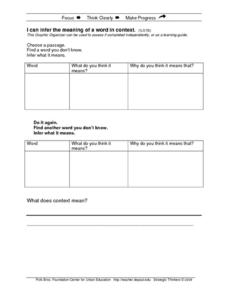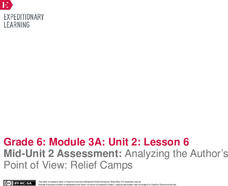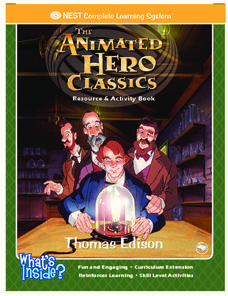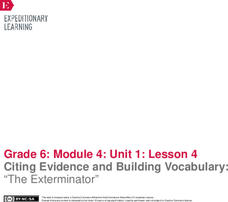K12 Reader
Determine the Meaning
Enhance elementary readers' vocabulary skills with a worksheet focused on context clues. Individuals read ten short sentences, each with an underlined word, and look over four options to find the most appropriate synonym that could...
Curated OER
Dictionary Use
Bring dictionaries back into your classroom! Although it's often preferred to look up a word's definition on a computer or smart phone, we still need to practice this important skill. Middle and high schoolers investigate how to use the...
EngageNY
Presentation of Events: Comparing Two Authors
Give a little clue! Readers learn how context clues can help them determine the meaning of words by viewing a Context Clues Resource sheet then completing a Context Clues
practice sheet. They then compare events presented by two...
E Reading Worksheets
Context Clues
Reinforce language and reading comprehension skills with a worksheet focused on context clues. Scholars carefully read twelve sentences, use prior knowledge and sentence clues to define an unknown word.
EngageNY
Reading for Gist: “Middle Ages” Excerpt 1
Dig deep. Scholars dig deep for meaning while reading Middle Ages Excerpt 1. They begin by finding unfamiliar words and adding them to a word catcher. Pupils then take a close look at adversity in the text and complete an anchor chart.
EngageNY
Getting the Gist and Determining Word Meaning: Paragraphs 12–14 of Steve Jobs’ Commencement Address (and connecting to Chapter 8)
Groups use a Venn diagram to compare the theme of love and loss in Steve Jobs' 2005 commencement address to Stanford University students and Christopher Paul Curtis' Bud, Not Buddy.
K12 Reader
Earthquakes: Movement of the Earth's Crust
Readers use context to determine the meaning of words found in a short article about earthquakes and the movement of the earth's crust.
K12 Reader
Context Clues: The Meaning Is There!
Learning how to use context clues is helpful for both reading comprehension skills and to determine the meaning of unfamiliar vocabulary words. As they read ten sentences with underlined words, learners choose the most...
Curriculum Corner
Academic Reading Vocabulary
From A to Z, learners define, draw, and find examples of specific reading focus skills in an alphabetized reading vocabulary packet. Words include dialogue, theme, text structure, genre, paraphrase, and many more.
E Reading Worksheets
Context Clues Vocabulary Builder Activity
Reading comprehension improves when you can use context clues to define unfamiliar words. Help your kids practice using context clues with a worksheet that provides space for seven sentences with new words, as well as a place for kids to...
North Clackamas School District
Context Clues: Synonyms
What do you do when you find a word that's not familiar to you? Help readers use context clues when encountering unfamiliar words with a grammar activity. They note the parts of the sentences that show the meaning of the word, write how...
EngageNY
Reading for Gist: “Middle Ages” Excerpt 2
Read and repeat. Scholars repeat the strategies for digging deeper into text from lesson two. This time they focus on Middle Ages Excerpt 2. Learners write unfamiliar words in the word catcher and use details from the text to add to the...
EngageNY
Getting the Gist and Determining Word Meaning: Paragraphs 20–23 of Steve Jobs’ Commencement Address (and connecting to Chapter 10)
Groups create a list of the character traits of Steve Jobs and Buddy, the main character of Christopher Paul Curtis' Bud, Not Buddy, and share and select evidence from Jobs' 2005 Stanford University Commencement Address to support their...
EngageNY
Reading for Gist and Answering Text-Dependent Questions: Chapter 5 of World without Fish
Discover the rules of fishing. Pupils read chapter five of World without Fish to discover ideas about the rules and laws of fishing. They use sticky notes to annotate text as they read about fishing in other countries. They focus on the...
Polk Bros Foundation
I Can Infer the Meaning of a Word in Context
Work on developing strategies for determining the meaning of unknown words and phrases with a quick context clues exercise. Class members choose two words from their reading and write down what they think they mean and why. See the...
Tennessee State Museum
Deciphering the Document: Unlocking the Meaning of the Emancipation Proclamation
Help your learners truly understand the Emancipation Proclamation by asking them the put it into their own words. After reading the document out loud to the class, and briefly discussing the legal language, split your class into small...
EngageNY
Mid-Unit 2 Assessment: Analyzing the Author’s Point of View: Relief Camps
We're halfway there ... what a relief! Scholars read an excerpt from a primary source about the relief camps associated with the1906 San Francisco earthquake. Next, they complete a mid-unit assessment, answering short-answer and...
Curated OER
Express Yourself Lesson Seed 2
Use Langston Hughes's poem, "Words Like Freedom," to explore the concepts of freedom and liberty. Learners read the poem, determine the theme, and use the provided graphic organizer to examine the connotative and denotative meanings of...
EngageNY
Launching the Module: Quotes about the Middle Ages
Pick a corner. Scholars receive a quote about the Middle Ages and then participate in a four corners activity by choosing a corner pertaining to their quotes. They then work in groups of three to discuss the bold words in their quotes....
EngageNY
Reading for Gist and Answering Text-Dependent Questions: Chapter 4 of World without Fish
True or false? Scholars read chapter four of World without Fish and explore the idea of a myth. They discuss in triads the meaning of the myth of nature’s bounty. Learners annotate the text on sticky notes and then answer text-dependent...
EngageNY
Tracing the Idea of Fish Depletion: Chapter 2
Scholars read chapter two of World without Fish to learn more about the fishing industry. Learners discuss in triads what it means for fishing to become an industry. They then write the gist of pages 28-33 on sticky notes and answer...
EngageNY
Building Background Knowledge About the Hero’s Journey, Part 2: Acts 2 and 3 Plus Focusing on Key Vocabulary in “The Hero’s Journey”
It's all in the details. Scholars read acts two and three of The Hero's Journey and collect important details from the text. They share their notes with their peers and listen for key words from the story. They then turn their attention...
NEST Family Learning
Thomas Edison: Resource and Activity Book
What other inventions was Thomas Edison responsible for besides the telegraph and lightbulb? Incorporate a set of worksheets into your study of Edison and other inventors. The 48-page packet includes all types of activities from word...
EngageNY
Citing Evidence and Building Vocabulary: “The Exterminator”
It is an out-of-body experience. Scholars take a look at the sidebars outside the body of the text in The Exterminator. They discuss the purpose of this type of text feature and work to determine the gist. Learners write unfamiliar...
Other popular searches
- Multiple Meaning Words
- Multiple Meanings
- Words With Multiple Meanings
- Multiple Meaning Words Words
- Inferring Meaning of Words
- Multiple Meanings for Words
- Multiple Meaning Words Math
- Multiple Meanings of Words
- Opposite Meaning Words
- Multiple Meaning Words.
- Multiple Meaning Words\
- 3rd Grade Multiple Meanings










